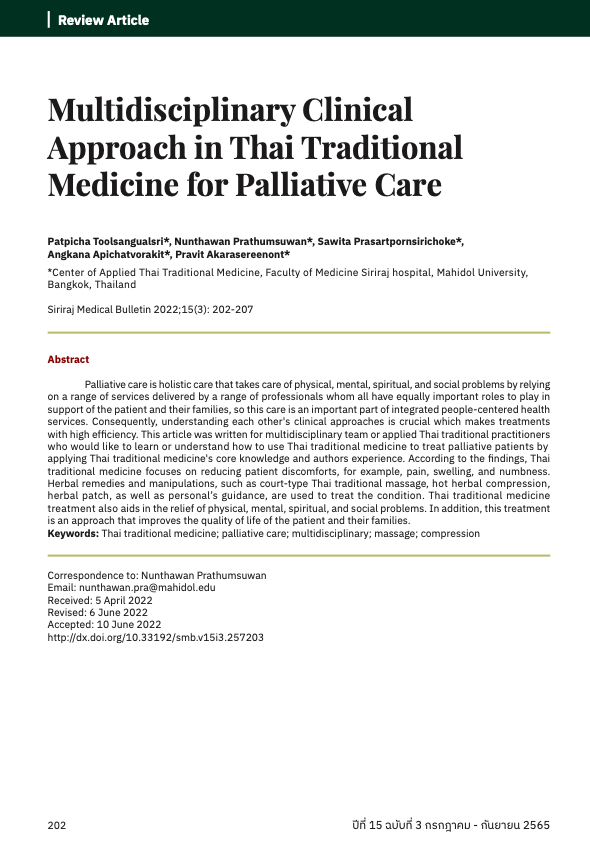Multidisciplinary Clinical Approach in Thai Traditional Medicine for Palliative Care
Main Article Content
Abstract
Palliative care is holistic care that takes care of physical, mental, spiritual, and social problems by relying on a range of services delivered by a range of professionals whom all have equally important roles to play in support of the patient and their families, so this care is an important part of integrated people-centered health services. Consequently, understanding each other's clinical approaches is crucial which makes treatments with high efficiency. This article was written for multidisciplinary team or applied Thai traditional practitioners who would like to learn or understand how to use Thai traditional medicine to treat palliative patients by applying Thai traditional medicine's core knowledge and authors experience. According to the findings, Thai traditional medicine focuses on reducing patient discomforts, for example, pain, swelling, and numbness. Herbal remedies and manipulations, such as court-type Thai traditional massage, hot herbal compression, herbal patch, as well as personal’s guidance, are used to treat the condition. Thai traditional medicine treatment also aids in the relief of physical, mental, spiritual, and social problems. In addition, this treatment is an approach that improves the quality of life of the patient and their families.
Article Details

This work is licensed under a Creative Commons Attribution-NonCommercial-NoDerivatives 4.0 International License.
References
Palliative Care [Internet]. World Health Organization; [2020 August 5; cited 2021 September 20]. Available from: https://www.who.int/news-room/fact-sheets/detail/palliative-care
โรงเรียนอายุรเวทธำรงฯ สถานการแพทย์แผนไทยประยุกต์ คณะแพทยศาสตร์ศิริราชพยาบาล มหาวิทยาลัยมหิดล. การแพทย์แผนไทยในคณะแพทยศาสตร์ศิริราชพยาบาล. พิมพ์ครั้งที่ 2. กรุงเทพฯ: ห้างหุ้นส่วนสามัญ พี.เอส.เพรส; 2552.
Choorit K. Palliative Care...การดูแลด้วยหัวใจในยุค 4.0. TUH journal online. 2020;5:47-50.
Henson LA, Maddocks M, Evans C, Davidson M, Hicks S, Higginson IJ. Palliative Care and the Management of Common Distressing Symptoms in Advanced Cancer: Pain, Breathlessness, Nausea and Vomiting, and Fatigue. J Clin Oncol. 2020;38(9):905-14.
Phupun E-o, Skulphan S, Thungjaroenkul P. Mental health problems and spiritual needs among patients with cancer, Nakornping Hospital, Chiangmai province. The Journal of Psychiatric Nursing and Mental Health. 2018;32(3):75-89.
Tirapongprasert S, Samartkit N, Wiseso W. Factors Related to Spiritual Needs in Palliative Cancer Patients. The Journal of Faculty of Nursing Burapa University. 2021;29(1):67-79.
Sangchart B. Spiritual Well-being and Good Death. Journal of Nursing Science and Health. 2014;37(1):147-56.
พระปลัดอานนท์ กนฺตวีโร(ช้างแรงการ), พระมหาสุเทพ สุทฺธิญาโณ. พระสงฆ์กับการเยียวยาจิตใจ. วารสาร มจร มนุษยศาสตร์ปริทรรศน์. 2559;2(1).
สถาบันการแพทย์แผนไทย กรมพัฒนาการแพทย์แผนไทยและการแพทย์ทางเลือก กระทรวงสาธารณสุข. ICD-10-TM บัญชีรหัสกลุ่มโรค อาการ และหัตถการด้านการแพทย์แผนไทย. พิมพ์ครั้งที่ 1. กรุงเทพฯ: สำนักกิจการโรงพิมพ์ องค์การสงเคราะห์ทหารผ่านศึก ในพระบรมราชูปถัมภ์; 2558
ประกาศคณะกรรมการพัฒนาระบบยาแห่งชาติ. บัญชียาหลักแห่งชาติ; 2563. หน้า 276-89.
พรทวี ยอดมงคล. คู่มือสำหรับประชาชน การดูแลผู้ป่วยระยะสุดท้ายแบบประคับประคอง (Palliative Care). บริษัท พิมพ์ดี จำกัด: สำนักงานคณะกรรมการสุขภาพแห่งชาติ (สช.); 2556. หน้า 26.






